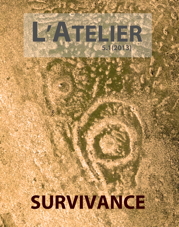Continuité et discontinuité dans Benang de Kim Scott : la survivance à l’œuvre
Mots-clés :
Scott, Kim, Littérature aborigène, Roman, PostmodernismeRésumé
Continuité et discontinuité de l’Histoire, des histoires, des mémoires, et de la narration, sont au cœur de l’œuvre Benang de Kim Scott, roman postmoderne qui remporta le prestigieux prix littéraire australien Miles Franklin en 2000. Le roman explore l’incertaine et douloureuse quête du narrateur pour reconstituer l’histoire de ses ancêtres et de sa famille, ainsi que son identité éclatée par le désir de son grand-père d’avoir fait de lui « le-premier-homme-né-blanc ». Cet article analyse comment l’écriture intertextuelle de Benang fait s’entrecroiser histoires, Histoires, et archives pour mettre en lumière l’histoire des politiques et pratiques d’élimination dites d’assimilation qui ont marqué l’existence des Aborigènes. Il souligne par quelles stratégies le romancier parvient à créer un récit à la fois hanté par le manque et qui s’érige contre le discours colonial. Il analyse comment l’écriture se révèle être une force de recréation dans Benang, dans lequel les traces ancestrales sont redécouvertes, renouvelées, et ouvrent sur un futur plein d’espoir. Cet article s’appuie sur le concept de survivance tel qu’il a été développé par l’écrivain amérindien Gerald Vizenor et repris par Deborah L. Madsen, pour montrer que la survivance dans Benang s’établit comme « présence active », « continuation des histoires », et comme « condition dynamique de survie historique et culturelle ».
The continuity and discontinuity of History, stories, memories and narrative are at the heart of Kim Scott’s postmodern novel, Benang, which won the prestigious Miles Franklin Award in 2000. The novel explores the narrator’s uncertain and painful attempts to reconstitute his family history and his identity which was shattered by his grand-father’s desire to make his grand-son “the first white man born”. This article examines how Benang’s intertextual writing weaves together stories and archives in order to bring to the fore the history of elimination policies and practices (the so-called assimilation policies) that impacted the lives of Aboriginal people in Australia. The article highlights the strategies through which the novelist creates a narrative that is haunted by absence while countering colonial discourse. It analyses the writing as a force of remaking, through which ancestral traces are rediscovered, renewed and thereby open onto a personal and collective future filled with hope. Drawing on the concept of survivance that was developed by Native American writer Gerald Vizenor and then taken up by Deborah L. Madsen, this article shows how survivance comes to light in Benang as “an active sense of presence”, the “continuance of stories” and “a dynamic condition of historical and cultural survival”.
Publiée
Numéro
Rubrique
Licence
-
L’envoi spontané d’un article à la rédaction de L’Atelier implique l’autorisation de publication et la cession des droits dans les limites établies par la loi de propriété intellectuelle.
-
L’Atelier conserve les droits de reproduction des articles publiés, quelque soit le support : internet, CD ROM, réimpression, photocopie, etc.
-
L’auteur conserve le droit de publier ultérieurement son article déjà paru dans L’Atelier avec la seule obligation de mentionner le nom de la revue comme source de la première publication.


